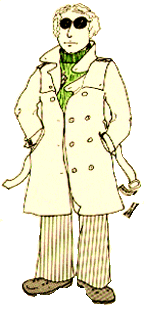 |
|
It happens every day in one city or another. You stand in line for two days, holding down the tenth place in line, to get tickets for the big concert, maybe the one with McCartney or Led Zep. The ads all said that no one will be allowed to buy more than four tickets at a time, so you know you'll get some of the best seats in the house, probably in the second or third row.
Finally, they open the ticket office but, by the time you get served, your choice is limited to seats up in the greys, so far from the stage that the band looks like little mice and the sound resembles the huffing and puffing of a train.
Naturally, you are upset. You demand an explanation from the box office manager and he tells you that the other tickets went for mail orders. Later, you discover that there were no mail orders but by then, of course, it's too late.
What happened? You've been scalped...
The ticket situation for major events like big rock concerts is becoming a public scandal in the United States. It seems likely that a similar uproar will be heard in Canada as well. More and more people are becoming aware that some of the most powerful box offices and ticket agencies on this continent are working hand-in-hand with ticket scalpers. In some cities, for some events, there are more tickets available through scalpers than through legitimate box office sales.
Scalping-selling a ticket for more than its face value (the price printed on the ticket) is illegal almost everywhere. Partly the illegality stems from the desire to provide equal access to good seats at fair prices for everyone who would like to attend the events. But the real reason for the illegality is income taxes: profits on ticket scalping are not reported to the income tax department, so the government loses its cut of this highly profitable business.
Illegal or not, the police seldom hassle the scalpers. No one really likes the tax man, so the police look the other way when they encounter a scalper. In Toronto, for example, tickets for the Toronto Maple Leafs hockey games are worth as much as four times their face value. Recently, the Toronto Globe & Mail ran an in-depth expose of the flourishing hockey ticket scalping industry. The next day, Toronto police rounded up several ticket scalpers and laid charges. However, matters have since returned to normal and the scalpers have gone about their business openly and without police interference.
How It Works
But what do the box offices have to do with all this? In many cases, the box offices are completely innocent of any wrongdoing. Scalpers may descend on the box office, buying up large blocks of tickets on their own. After all, very few events operate on the basis of a limit to the number of tickets available to any individual buyer. The box office at Maple Leaf Gardens in Toronto, for example, has nothing to do with the scalping operation; most Maple Leaf Gardens seats for hockey games are held by seasons ticket buyers. If they cannot attend a game, it is not unusual for the seasons ticket holders to turn their seats over to scalpers. But the Gardens staff have been known to take seasons tickets away from subscribers who are found to by supplying scalpers.
At other, perhaps the majority of, times, the box offices, ticket agencies and promoters are all involved with scalping, however.

The promoter the operator who arranges and runs the show, gets the tickets directly from the printer. He can pull as many tickets as he wants before turning the rest over to the box office. If the promoter knows that the show will be a sell-out but can't get the act itself to agree to a higher ticket price (which would mean more profit for the promoter), the promoter may pull a large number of tickets and arrange to sell them through scalpers who work for him. So the promoter gets his legitimate profit from the sale of seats through normal channels-and another, illegal, profit from scalping. The illegal profit can outweigh the legitimate profit.
Whatever tickets are left over go to the box office and ticket agencies. Employees of both those outlets may do exactly the same sort of thing as the promoter has done. So, by the time the tickets actually go on sale, the number of seats available to the public may have been reduced by 50% or more!
Is It Profitable?
Scalpers can earn impressive tax-free profits from their activities. However, there are always events that do not turn out to be as popular as everyone expectedand the scalpers can lose enormous amounts of money. One student in North York, a suburb of Toronto, went into the scalping business a couple of years ago. He started small, with only a pair of tickets, but managed to build that into a fairly substantial operation within a year, simply by channelling the profits from one event into more tickets for the next. The way he figured, he would be able to pay for his university education the next year. Then he put every nickel of his money into tickets for the Bay City Rollers-and couldn't scalp a single seat. He was last seen trying to unload his seats at 25 cents each.
In other words, scalping is much like playing the stock market or gambling in Las Vegas. There is the possibility of earning a lot of money in a hurry. And there's also the possibility of losing just as much money just as fast.
Still, there will always be scalpers around to foul up distribution of tickets for the best concerts and the most exciting sports events. There are even scalpers moving into the movies: for films like Star Wars that have been attracting huge crowds (who may have to wait in line for hours before getting a seat), some enterprising scalpers have been getting to the theatres early, buying tickets at regular prices, and selling them at higher prices to anxious viewers who arrive too late to get seats on their own.
The only solution to the problem is a public boycott. But there have always been black markets in highly-demanded goods and services, probably dating back thousands of years. So don't hold your breath. But, the next time you wait in line for days to get good seats only to be disappointed, don't accept a threadbare "explanation" call the police and let them decide what went wrong.
**Disclaimer**
This magazine article has been transcribed from
the original, with the emphasis on ensuring accuracy of actual
content. In keeping with this, all errors or dialectal adjustments
which occurred in the original published article were retained for
this electronic version.
©1999 TG Magazine/Le Magazine TG
tgmag@tgmag.ca